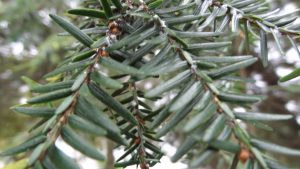Fall Plant Health Care – Horticultural Oil
The Hemlock below has the woolly masses of Hemlock Woolly Adelgid eggs between the needles or leaves pictured in the photo. Severe infestations resemble snow. Dormant oil or Fall Horticultural oil applications to your plants has many benefits. For hemlocks, the oil application suffocates hemlock woolly adelgid.
- Oils are effective controls of many plant pests.
- Advantages of oils include safety, effectiveness and limited effects on beneficial insects.
- Horticultural oil sprays are directed to specific targets and do not leave a residual impact on beneficial insects or other organisms.
Various oils have been used for centuries to control insect and mite pests. Oils are an important tool to manage certain pest problems (e.g., scales, aphids, mites) on fruit trees, shade trees and woody ornamental plants. Several recently developed oils extend this usefulness to flowers, vegetables and other herbaceous plants. Oils also can control some plant diseases, such as powdery mildew. Oils used to protect plants have been called by many names, but perhaps horticultural oils best describes them.
- For spider mites – hemlock, euonymus, forsythia, privet and pine.
- For scale – euonymus, cherry, magnolia, hemlock, pine, oak, taxus, rhododendron, fruit trees, blueberry.
- For hemlock woolly adelgid.
- For lace bugs – andromeda, azalea, rhododendron
- For winter moth – maple, birch, oak, blueberry and fruit trees.
Oils have different effects on pest insects. The most important is that they block the air holes (spiracles) through which insects breathe, causing them to die from asphyxiation. In some cases, oils also may act as poisons, interacting with the fatty acids of the insect and interfering with normal metabolism. Oils also may disrupt how an insect feeds, a feature that is particularly important in the transmission of some plant viruses by aphids.
Oils pose few risks to people or to most desirable species, including beneficial natural enemies of insect pests. This allows oils to integrate well with biological controls. Toxicity is minimal, at least compared to alternative pesticides, and oils quickly dissipate through evaporation, leaving little residue.


Leave a Reply
Want to join the discussion?Feel free to contribute!